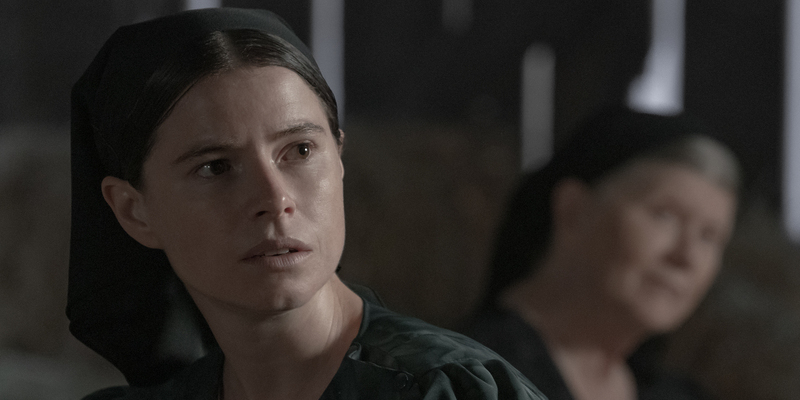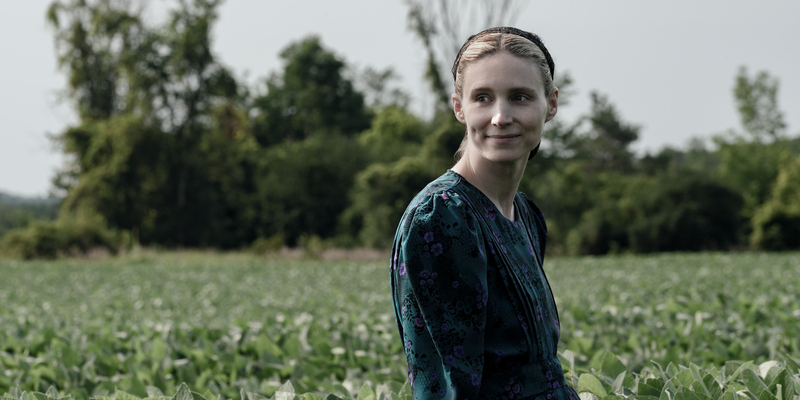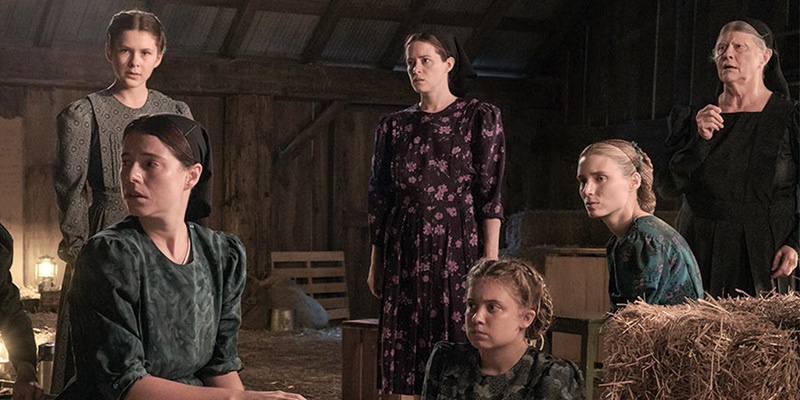
Review by
Eric Hillis
Directed by: Sarah Polley
Starring: Rooney Mara, Claire Foy, Jessie Buckley, Judith Ivey,
Ben Wishaw, Frances McDormand

Between 2005 and 2009, dozens of female members, aged from three to 65,
of a Bolivian Mennonite colony were sexually abused by men who would
sneak into their homes at night and knock out their entire families with
cow tranquiliser. Inspired by the ghastly case, author
Miriam Toews, who was raised in a similar commune herself, wrote
the 2019 book Women Talking, which imagines a debate between the colony's women over whether to
leave, stay and fight the men, or stay and pretend nothing had
happened.
It should be a great setup for a movie, but in the hands of
writer/director Sarah Polley it's a confusing and frustrating
experience, a missed opportunity given the story's potential and the
impressive cast she's assembled, which includes the likes of
Rooney Mara, Claire Foy, Jessie Buckley and
Frances McDormand.

Polley's film opens at the point where several men have been arrested
by the local police. The rest of the men, save for sympathetic teacher
August (Ben Whishaw) and transgender assault victim Melvin (August Winter), have headed into town to post bail for the accused. Using this
window of opportunity, several of the colony's women gather in a hay
loft to carry out their debate.
Women Talking has the makings of a great piece of
confrontational drama in the mould of 12 Angry Men, but the film never seems all that interested in its central debate.
It isn't so much a case of one section of the women convincing the
others to come over to their side as it is a game of ideological musical
chairs. The final decision feels arbitrary, as though the movie's run
time had lapsed and some decision, any decision, had to be made at that
moment. The women certainly do a lot of talking, but not so much
debating or even conversing. Much of the film consists of monologues
that stray from the central urgent decision at hand in order to make
some crude points about the potential for evil that lurks within men.
Perhaps because one of its producers is alleged domestic abuser
Brad Pitt, the movie is keen to point out that not all men (a
character literally says the words "not all men" at one point) are bad,
as represented by Whishaw's August, a nervy type who comes off as a
parody of a male feminist ally.

The main issue with Women Talking is that it never
convinces us it's taking place in the real world. Polley moves the story
from Bolivia to the US, which raises a lot of questions that are left
unanswered. For a start, where are the authorities? Wouldn't the FBI be
all over this place, Waco style? Likewise, wouldn't the colony be
swamped by the media? Such questions could have been dismissed had
Polley opted to set the film a hundred years ago or more, which would
have had no effect on the central narrative.
There are similar questions about the workings of the Mennonite colony.
In the real life case the attackers knocked out entire families,
including husbands and sons, but Polley's version suggests that the
women victims were living alone, which seems odd for a Mennonite colony.
Don’t these people get married off at a young age? How are there so many
single women in this place? We're told that the women have been denied
any form of education, yet they speak as though they're attending a
student union meeting at Sarah Lawrence. Perhaps the biggest question is
why all the men would leave, allowing the women a chance to conspire
against them.

Women Talking plays very much like a secular critique of
religion, one that displays a misunderstanding of the religious mindset.
We're told the women have been convinced from childhood that if they
disobey their men they will forfeit their place in the kingdom of
Heaven, and that if they don’t forgive their attackers they'll be turned
away from the pearly gates. You would think then that this would be the
central bone of contention in this debate – after all, acceptance into
God's kingdom is what these women have built their entire lives around –
but it's barely raised. People don’t tend to walk away from their faith,
regardless of how they've been treated by those who administer it.
Believe me, I'm Irish, so I'm well familiar with women clinging onto
religion despite being treated horrendously by the church. My late aunt
was imprisoned in a Magdalene laundry as a teen for the crime of
becoming pregnant out of wedlock, and her child was stolen from her and
sold to a family in the US. Despite this, she continued to attend mass
for the rest of her life. It's no surprise that in the real life case
the women opted to stay despite the horrors that had been inflicted upon
them. Polley opens her film with a pretentious bit of text that declares
her film a work of "female imagination." A flight of fancy might be more
apt.


